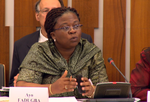Ayodeji FADUGBA
contribution 13 -
FADUGBA Ayodedji

tags
ICTR assessmentoriginal version
Thank you very much. The one comment I wanted to make is something that we did not have time to talk about during these proceedings, it is the fact that for the contribution of the ICTR, I think that from the Office of the Prosecutor we also see a role of mobilisation, because the International Tribunals are limited in time and space, but what we have been able to do is start the work of mobilisation.
I remember last year that the Prosecutor called a conference of national prosecutors to discuss the challenges that are inherent in trying to prosecute these crimes as a way of mobilising to close the impunity gap even after the ICTR closes. So there is also an advantage to the completion strategy because it allows us to build capacity for other actors, especially national actors.
And I remember very well a few of the topics: Challenges of extradition, challenges of national prosecutions for international crimes, challenges of prosecuting these crimes within Africa, challenges of investigating sexual violence crimes. I mean, this is an achievement also in the sense that maybe we haven’t solved all the problems, but we are raising the issues for those who really have to solve the problems. And we hope that the prosecutors are going to go back to their national jurisdictions, raise awareness, start working within the system, within a political system that is going to be agreeable to changing the rules and agreeable to creating the conditions that allow us to bridge the impunity gap besides the international model. Whether we’ve been a model or a non‑model, we have raised the problems, we have flagged the issues. And I think there is continuity, not necessarily with us, but with those we are able to mobilise to continue the work. Thank you very much.
Vincent CHETAIL
Professor Degni-Ségui, please.

